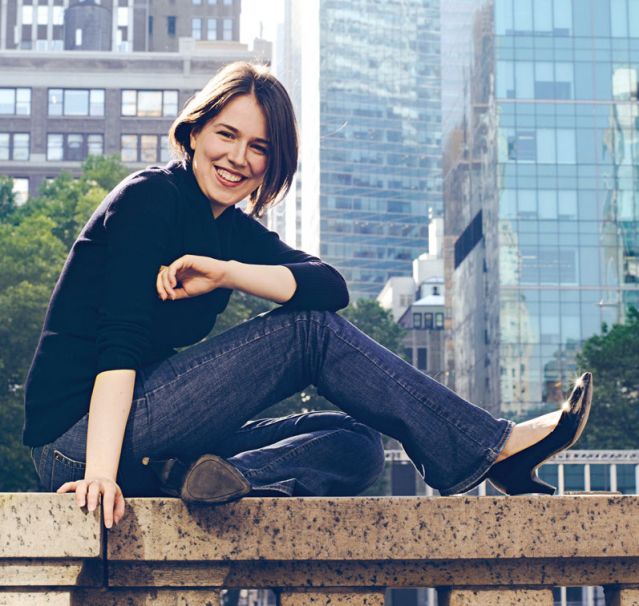
Since she was a little girl in Ukraine, self-described “surprisologist” Tania Luna has plotted adventures for others. Today, she makes a career of it, arranging novel experiences for individuals and groups through Surprise Industries, which she launched in Brooklyn, NY, in 2009. The co-author, with LeeAnn Renninger, Ph.D., of Surprise: Embrace the Unpredictable & Engineer the Unexpected, Luna is spreading the message that not only is life not worth living without surprise; it may not even be possible.
How do you know if you’re a surprisologist?
You have a desire to delight people. You have some weird selfish/selfless urge to create experiences for people so they can feel an unexpected surge of joy. And you have a desire for novelty and exploration and stepping outside your comfort zone.
How do you engineer your surprise experiences?
When we started the company, we just put a calendar on the website that had dates and times. You would purchase a ticket and show up having no idea what you’d be doing—it could be a steel drumming class, or kayaking, or ice sculpting. Then we started getting requests for custom experiences. So we designed a questionnaire to determine what the recipient’s comfort level is, what their likes and dislikes are, and what would delight them. And then we would design a surprise.
What have been some of your favorites?
I love surprises where the person feels like the people who engineered it love and appreciate them. Once a school contacted us about a teacher who had been almost completely paralyzed in a motorcycle accident. The community really loved her. She was a thrill seeker, and she loved adventure, so we researched what was possible, and we were able to get a flight lesson for her. She took off and flew over the school, and the whole community came out and held signs for her.
Do you like to be surprised?
I’m an introvert, so I don’t like a ton of attention, or the kind of surprises that startle you. As a child in Ukraine, we moved a lot and then we were granted asylum in the U.S. because of the Chernobyl accident; there was so much unpredictability that my response was “no surprises”—everything had to be controlled so I could be safe and secure and in charge.

PROFESSION: Surprisologist CLAIM TO FAME: Proselytizes for the unpredictable, from talking to strangers to ice sculpting to riding in helicopters.
What changed?
Well, the downside of that control is that you mute your capacity for emotion and experience. You look back on your life and think, “What did I do that year? Well, I was OK, I was safe.” But that’s all. I want to look back and remember weird things I did, like my husband and I going to a haunted house even though I hate being scared. I’m working on forcing myself to give up control. It doesn’t come naturally. But what it means to be human is that we get to feel and do all these cool things.
Do you ever avoid experiences where you’re not in control?
I almost never do. I don’t think I could live with myself. As long as it doesn’t clash with my values, I’m in.
You say surprise is not an emotion, but an “intensifier.” What does that mean?
No matter how amazing your life is—you get to fly first class or you get all this cool technology or your couch is super comfortable—there is still inevitably this flat line of emotional intensity. Surprise is the antidote to that, because the moments when your emotions are intensified are the moments you remember, the ones that make up the emotional capital of your life. I think we seek more intensity to avoid the feeling of one day blurring into the next—which may be a First World problem, but it is a real problem.
How can we intensify our everyday lives?
Continuously step outside of whatever your bubble is. You think that you shouldn’t be listening to heavy metal? Actually, maybe it’s good for your brain to listen to some heavy metal. Pick a TV channel and say, “I’m going to watch this for five minutes and get really curious. Someone went through all this trouble to put it out there. What can I learn from this?” Start exposing yourself to little buried surprises that you didn’t notice.
Where else can we find it?
Utilize the people around you. Let them become “delight machines” that tell you and ask you unexpected things. Say you’re in an elevator and you want to give a stranger a compliment. Your brain says, “Stay comfortable, stay safe, do the thing that’s predictable.” But you have to give up control if you’re going to give the stranger a compliment because you’re inviting in surprise; you have no idea how this person’s going to react.
So why don’t most of us do it?
Most of us dislike uncertainty and surprise. Have you ever gone on vacation and before you leave, you look up every picture that’s available of where you’re going, including what your hotel room looks like? We call that “googling away delight,” because then you show up and it’s exactly what you thought it was going to be and your brain just says, “OK, here I am. It’s over.” You’ll have a much better time if you allow yourself to be surprised.
Do people expect you to constantly jump out of alleys screaming, “Boo”?
I do that from time to time. Once I was in the bathroom at a conference, and when I heard one of the organizers outside, I thought, “I can’t just exit this stall; it’s my responsibility to surprise,” so I threw the door open and jumped out at her.
Aside from that, what makes a great surprise?
Just because it’s unexpected doesn’t mean it’s good. You can’t just surprise people in the way that you think is fun; you have to pay attention to what is going to be meaningful tothem.
What happens when we don’t have novelty in our lives?
When we talk about stress in our society, what we really mean is distress—too much stimulation. We rarely talk about hypostress, which is not enough stimulation. And that’s just as dangerous. It’s correlated with poor academic performance, burnout at work, and relationship problems. One of the best predictors of divorce is boredom. That’s serious.

AstroStar/Shutterstock
How do we build surprise into our relationships?
It’s a lot of work, but it’s really lovely if you put effort into your relationship from a surprise perspective. I keep a log of all the little things my husband mentions being interested in so that every once in a while I can get him a little surprise gift. And he is a master at engineering surprises: I’ll come home and he’ll be hiding somewhere in the house, or there will be a Nerf gun on the door and I’ll have to find him and shoot him with it. I’m very grateful, and occasionally angry with him for that.

No comments:
Post a Comment